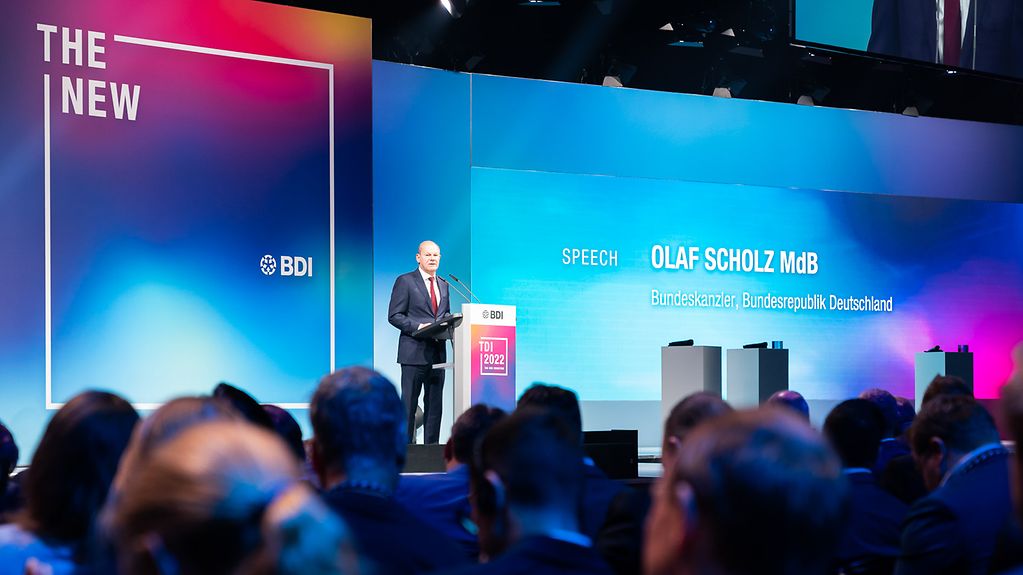Federal Chancellor at Industry Day
Olaf Scholz outlined the major challenges for business, society and politics at Industry Day in Berlin. He explicitly named Russia’s war of aggression, the energy transition and climate protection, digitalisation and the pandemic. According to Scholz, the aim was to solve these major problems together.
4 min reading time

Federal Chancellor Olaf Scholz at Industry Day: “Giving a new foundation to competitiveness and prosperity.”
Photo: Federal Government/Kugler
“We face major upheavals, the like of which we have not experienced in such a concentration in our lifetimes,” said the Federal Chancellor, addressing the delegates of the Federation of German Industries (BDI) in Berlin. “Climate, the energy transition, digitalisation, the pandemic, now Putin’s murderous war with all its consequences for world trade, world nutrition and global stability – this turning point has many facets.”
Currently, the major crises could only be solved together, he said. This also applied to Germany’s transition to a climate-neutral, but still competitive industrial base.
Together with “concerted action” and “alliance for transformation”
Scholz demanded joint social efforts to prevent inflation from taking a firm hold over Germany, saying it was important to avoid a permanent inflationary spiral. “This must be in the interests of all those responsible.” He had therefore invited employers and trade unions to the launch of a so-called “concerted action” in the Chancellery on 4 July. Currently, the major crises could only be solved together, he said. In this context, he also cited the “Alliance for transformation” – a central discussion forum in which the Federal Government consults on all the important questions about the transformation with business, trade unions and associations.
Federal Finance Minister warns of consequences of inflation
During his speech at Industry Day (TDI), Federal Finance Minister Christian Lindner also warned of the serious consequences of high inflation. He said that this would erode the economic basis for everything else. This is why priorities must be set in the budget and funding must be called into question, he said, adding that he wanted to return to the debt limit.
EU sanctions against Russia – EU candidate status for Ukraine
The Federal Chancellor defended the “unprecedentedly harsh” EU sanctions against Russia, saying that they were important. “Freedom has its price. Democracy, solidarity with friends and partners has its price. And we are prepared to pay this price,” the Federal Chancellor stressed. He thanked the economy for going along with this course from the beginning.
“Ukraine belongs to us, it belongs to the European family.” For this reason, he continued, he would argue for Ukraine to receive EU candidate status at the EU Summit in Brussels.
In addition, Germany would continue to support Ukraine with weapons, “for as long as Ukraine needs our support”.
Use of renewable energy in the overriding public interest
The Federal Chancellor also spoke about four specific promises which he had made at the previous year’s TDI – Industry Day. “I am here today to say to you:
these four specific promises are still valid.” Scholz addressed the first promise – a decisive expansion of renewable energies – and called the Federal Government’s Easter package the greatest legal amendment in energy policy for decades,
saying that it had created important foundations for the accelerated expansion of photovoltaic energy, including for wind power at sea and on land. “As a general principle,
the use of renewable energies is now in the overriding public interest and contributes to public security,” the Federal Chancellor stressed.
More energy and planning security
The aim here was clear: “As early as 2030, 80 percent of our electricity requirements and 50 percent of heat requirements are to be covered by renewable sources.” This would mean more energy security and more energy sovereignty for Germany as a whole, and greater planning security and cheaper energy prices in the long term for industry. The second promise had also been kept: the abolition of the EEG – Renewable Energy Sources Act levy. Pulling out all the stops to reduce electricity prices was therefore the order of the day. The third promise – accelerated planning and authorisation procedures – had also been kept. The Federal Chancellor announced that decisions would be made to shorten these procedures by the end of the year.
G7 Summit: go-ahead for International Climate Club
The Federal Chancellor is honouring the final promise with the creation of an International Climate Club. “In just a few days, as host of the G7 Summit in Elmau, I will give the go-ahead for an open and cooperative International Climate Club. Ultimately, we can only promote climate protection and our economy if increasing numbers of states worldwide see concrete advantages in taking the path towards climate neutrality themselves.” It was very important for emerging countries, too, to participate in this climate club, which was intended to set comparable standards for climate protection measures.